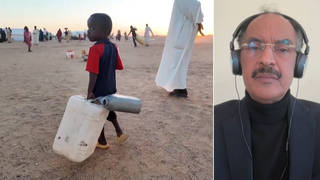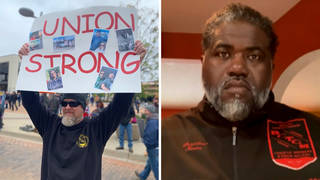
Guests
- Saket Sonidirector of the National Guestworker Alliance.
- Decebal "John" Bilanstudent from Romania who came on a J-1 visa to the United States. He was one of the 300 guest workers who participated in the strike at the Hershey’s plant in Pennsylvania.
- Zhao Huijiaoa 19-year-old student of foreign languages at Dalian University in China. She came to the U.S. on a J-1 visa. Huijiao is one of the 300 guest workers who participated in the strike at the Hershey’s plant in Pennsylvania.
We look at the story of 300 foreign students who came to the United States as part of a work-study program and found themselves engaged in what they refer to as captive labor at a Hershey’s packing plant in Palmyra, Pennsylvania. The students — from Eastern Europe and Asia — went on strike two weeks ago, after they were reportedly required to lift heavy boxes, work eight-hour shifts beginning at 11 p.m., and stand for long periods of time while packing candy on a fast-moving production line. Federal agencies have launched four investigations into the alleged exploitation. The walkout apparently marks the first time that foreign students have engaged in a strike to protest their employment. The guest workers are demanding a return of the $3,000 to $6,000 each student paid for the cultural exchange program to work at Hershey, that Hershey end exploitation of J-1 student cultural exchange workers, and that the 400 jobs the guest workers filled instead be given to local workers paid a living wage. We speak to two of the student guest workers who took part in the strike at the Hershey plant: Decebal Bilan, an economics student from Romania, and Zhao Huijiao, a foreign languages student from China. We are also joined by Saket Soni, director of the National Guestworker Alliance. “Today the J-1 program has essentially become the United States’s largest guest worker program,” says Saket. He notes that while students are recruited ostensibly for cultural exchanges, “they do learn about American culture, just the wrong part of American culture.” [includes rush transcript]
Transcript
JUAN GONZALEZ: We turn now to the story of 300 foreign students who came to the U.S. as part of a work-study program and found themselves engaged in what they refer to as captive labor at a Hershey’s packing plant in Palmyra, Pennsylvania. The students from Eastern Europe and Asia went on strike two weeks ago after they were reportedly required to lift heavy boxes, work eight-hour shifts beginning at 11:00 p.m., and stand for long periods of time while packing candy on a fast-moving production line. Federal agencies have launched four investigations into the alleged exploitation.
The student workers recorded an open appeal to Hershey’s CEO John Bilbrey. They’re still waiting for an official response. Here’s a clip from their appeal.
STUDENT WORKERS: Dear Mr. Bilbrey, we are students from all over the world. We paid $3,000 to $6,000 each for a cultural exchange this summer. Instead, we became captive workers, working in a Hershey’s packing plant. When we organized, we faced threats of retaliation. We write our demands in a petition and go on strike on three days. In those three days, hundreds of thousands of Americans heard our story and told us they supported us.
Your response is different. You sent police to surround our peaceful protest. You arrested our allies. And in public, you passed the buck and pretended it wasn’t your problem. Then you told your subcontractors to offer us bus tickets for weekend trips. Bus tickets? This offer is insulting. You haven’t said a single word directly to us about our demands.
We know that American CEOs are busy people. I heard you made $4.2 million last year. We know that Hershey has made over $1 billion in profit this year. But ordinary Americans, they are struggling.
JUAN GONZALEZ: Those were the voices of foreign guest workers who say they were exploited at a Hershey plant.
AMY GOODMAN: The students came to the United States through a long-established State Department summer J-1 visa program that allows them to work for two months and then travel. However, in recent years, the program has drawn complaints from students about low wages, unexpectedly difficult work conditions.
It appears, however, the walkout at the Palmyra plant is the first time foreign students have engaged in a strike to protest their employment. The guest workers are demanding a return of the $3,000 to $6,000 each student paid for the cultural exchange program to work at Hershey, that Hershey end its exploitation of J-1 student cultural exchange workers, and that the 400 jobs the guest workers filled instead be given to local workers paid a living wage. The students have collected more than, oh, 63,000 petition signatures from Americans supporting their demands.
JUAN GONZALEZ: A spokesman for Hershey’s, Kirk Saville, said the company—the chocolate company did not directly operate the Palmyra packing plant, which is managed by a company called Exel. He declined our offer to come on the show but did provide this written quote: “Hershey cares deeply about all of its employees and those of its vendors. We were disappointed to learn that some of the students were dissatisfied in the cultural immersion element of the program. Hershey is partnering with the students’ employers to address this in a manner consistent with Hershey’s values. We strongly support Exel’s decision to discontinue the use of the J-1 program in staffing this facility,” end of quote.
Well, about 30 of the foreign student workers came to New York yesterday to protest in front of Hershey’s store in Times Square, and two of them join us now in our New York studio. Decebal Bilan is an economics student from Romania, and Zhao Huijiao is a foreign language student from China. Both of them participated in the strike at the Hershey plant. We’re also joined by Saket Soni, director of the National Guestworker Alliance.
We welcome all of you to Democracy Now! I’d like to start with the students. Could you talk about why—how you decided to engage in this work action at Hershey?
DECEBAL BILAN: It all begins when we are back home to our countries. Some of the students who came here in America in the last years, they told us about their experience. And we have an agency in our country. They recruit us, and we pay them, of course, for this. And we saw—before I came here, I saw America like a good opportunity to meet Americans, to travel.
AMY GOODMAN: How old are you?
DECEBAL BILAN: Twenty-two years old.
AMY GOODMAN: Zhao, you were one of the key organizers of the action. You came from China?
ZHAO HUIJIAO: Yeah.
AMY GOODMAN: Where in China? And how did you even learn about this program? And what did you understand was happening when you came here? What did you understand you would be doing?
ZHAO HUIJIAO: Actually, this program, we have the agencies in China, and they put the advertisement in our university. And they told us we can come to America to work and travel. We can earn money. And we can use the money we earn to travel around America.
AMY GOODMAN: How much money did you earn?
ZHAO HUIJIAO: Oh, God, only 8.1 dollars per hour.
AMY GOODMAN: And you were working full time, the midnight shift at the plant?
ZHAO HUIJIAO: I worked at the second shift from 3:00 p.m. to 11:00 p.m.
AMY GOODMAN: Same, John?
DECEBAL BILAN: Yes, same.
JUAN GONZALEZ: And again, in terms of your deciding to go public with this, what happened? How did you manage to organize yourselves and to decide to go out on strike?
ZHAO HUIJIAO: Because we came here for cultural exchange, but since we go into the factory, we just do the physical works, and there is no cultural exchange. And it’s really made us get healthy problems. And we have—
AMY GOODMAN: Health problems?
ZHAO HUIJIAO: Yeah, health problems.
AMY GOODMAN: John, what was your job?
DECEBAL BILAN: I was—being a boy, I was doing the hardest jobs there. I was stacking at supplier. Basically, this means I lift boxes all day, all eight hours. For example, you know, one of the hardest days, mine was like, I lift 12 tons. That means half-full load the truck. And it’s very hard.
AMY GOODMAN: Saket Soni, you’re the director of National Guestworker Alliance. Talk about the J-1 program, how these students who came to the United States to do travel and to work ended up doing this kind of full-time work at the plant.
SAKET SONI: Well, Amy, you know, this is really the story of how far a corporation is willing to go to cut costs, to deny permanent good jobs to local people, and to maximize profits. The J-1 visa program was started in 1961. It was part of the United States’s effort to win the Cold War. It was part of a goodwill campaign to try to bring in foreign students, like them, and have them meet Americans and learn about the American way.
Unfortunately, we’ve come a long way in what the American way is. Today the J-1 program has essentially become the United States’s largest guest worker program. Students like them, from across the world, are recruited ostensibly for cultural exchanges. And they come in, and, like them, they do learn about American culture, just the wrong part of American culture. They learn about corporate greed, and they learn about how American corporations use captive workers.
So these workers paid $3,000 to $6,000 apiece. They were expecting work and travel. Instead, they came into a company town, were forced to live in company housing, charged quite a large sum of money, way above market value, for the privilege of living in company housing. And, most importantly, when they started to organize, they faced threats and retaliation.
JUAN GONZALEZ: Now, you’ve made the point that companies like Hershey have become less of a direct manufacturer and more of a marketing agent and that they spin off their manufacturing to these suppliers now.
SAKET SONI: That’s right. That’s right. I mean, you know, the quote from Hershey that you had up on the screen a little while ago is very instructive. These used to be permanent jobs inside the Hershey chocolate factory. Hershey’s then took those jobs out of the factory, outsourced them, and created four layers of subcontractors between them and these students.
AMY GOODMAN: We only have a few seconds. Hershey said, “We were disappointed to learn that some of the students were dissatisfied in the cultural immersion element of the program.” You’re demanding that these, what, something like 400 jobs be given to local workers at a living wage?
DECEBAL BILAN: Yeah, exactly. Our first demand is we want to get our money back, of course.
AMY GOODMAN: And what has Hershey said about that?
DECEBAL BILAN: They don’t say anything until now. Our second demand is, no more students to come to work here, because they work only with students all year round. And we want these jobs to become living-wage jobs to local people, because this is normal.
AMY GOODMAN: We want to thank you for being with us. We will link to the stories about this at our website, democracynow.org. I want to thank “John” Bilan from Romania, Zhao Huijiao from China, and also Saket Soni, director of the National Guestworker Alliance.













Media Options